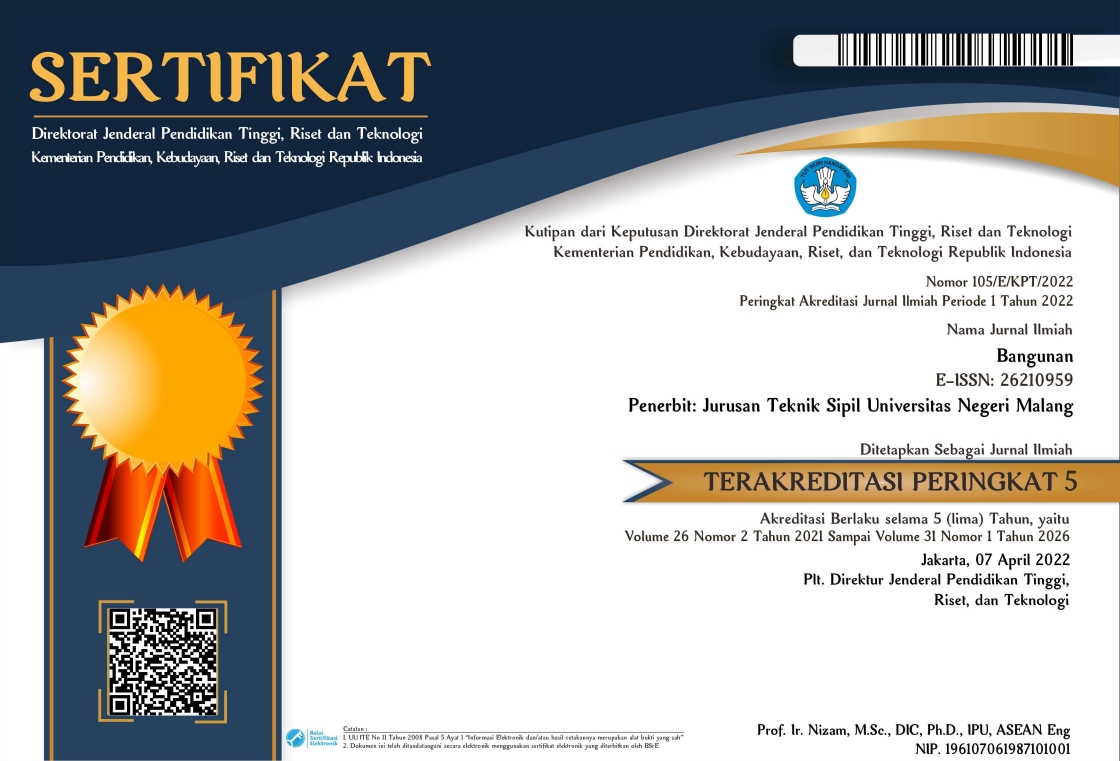PENGEMBANGAN BAHAN AJAR E-BOOK PLAMBING AIR KOTOR UNTUK PEMBELAJARAN TEORI DAN WORKSHOP UTILITAS BANGUNAN PROGRAM STUDI PENDIDIKAN TEKNIK BANGUNAN
Abstract
Abstrak:E-learning merupakan model pembelajaran dalam format digital dengan memanfaatkan sarana dan pasarana elektronik. Tujuan penggunaan e-learning dalam sistem pembelajaran adalah untuk memperluas akses pendidikan kepada masyarakat, sehingga pem-belajaran dapat diakses dengan mudah, tanpa diabatasi ruang dan waktu, interaktif, dan efektif. Pengunaan buku elektronik (e-book) merupakan salah satu sarana pembelajaran e-learning. Penelitian ini bertujuan : 1) mengembangkan bahan ajar berupa buku elektronik / e-book plambing air kotor, untuk pembelajaran teori dan workshop Utilitas Bangunan program studi Pendidikan Teknik Bangunan. Penelitian ini menggunakan model penelitian pengembangan (Research and Development / R&D); 2) validasi / menguji bahan ajar yang telah dihasilkan oleh ahli materi, ahli media, pengguna. Langkah penelitian awali dengan analisis potensi masalah, dilanjutkan dengan pengumpulan data, menyusun bahan ajar, validasi, revisi, uji coba, dan revisi bahan ajar. Penelitian ini menghasilkan produk bahan ajar berupa buku elektronik/e-book plambing air kotor dalam format.exe. Uji kelayakan / validasi bahan ajar elektronik ini oleh ahli materi, ahli media, serta uji coba pengguna oleh mahasiswa. Kesimpulan validasi bahan ajar e-book ini skor ahli materi 89 kategori sangat valid, validasi ahli media dengan skor 94 kategori valid, dan validasi pengguna (mahasiswa) dengan skor 90 kategori valid, sehingga diperoleh validitas kumulatif 91. Disimpulkan bahwa pengembangan bahan ajar buku elektronik / e-book Plambing Air Kotor dengan kategori valid atau layak untuk dipergunakan sebagai bahan ajar pada pembelajaran matakuliah Teori dan Workshop Utilitas program studi Pendidikan Teknik Bangunan jurusan Teknik Sipil.
Kata-kata kunci: bahan ajar, buku elektronik, utilitas bangunan
Abstract: E-learning is a learning model in digital format by utilizing electronic means and markets. The purpose of using e-learning in a learning system is to expand access to education for the community, so that learning can be accessed easily, without being limited by space and time, interactively, and effectively. The use of electronic books (e-books) is one of the means of e-learning. This study aims to: 1) develop teaching materials in the form of electronic books / e-books on sewage pumps, for theoretical learning and workshops on Building Utility of the Building Engineering Education study program. This study uses a research and development (R&D) model; 2) validation / testing of teaching materials that have been produced by material experts, media experts, users. The research step begins with an analysis of potential problems, followed by data collection, compiling teaching materials, validation, revision, testing, and revision of teaching materials. This research produces teaching materials in the form of an electronic book/e-book for plumbing dirty water in .exe format. The feasibility test / validation of these electronic teaching materials by material experts, media experts, and user trials by students. The conclusion of the validation of this e-book teaching material is that the material expert score is 89 very valid categories, media expert validation has a score of 94 valid categories, and user (student) validation with a score of 90 valid categories, so that the cumulative validity is obtained 91. It is concluded that the development of electronic book teaching materials / e-book Plumbing Dirty Water with a valid or appropriate category to be used as teaching material in learning the Theory and Utility Workshop courses in the Building Engineering Education study program majoring in Civil Engineering.
Keywords: teaching materials, electronic books, building utilities
Full Text:
PDFDOI: http://dx.doi.org/10.17977/um071v27i12022p39-52
Refbacks
- There are currently no refbacks.

This work is licensed under a Creative Commons Attribution-ShareAlike 4.0 International License.

This work is licensed under a Creative Commons Attribution-ShareAlike 4.0 International License.


